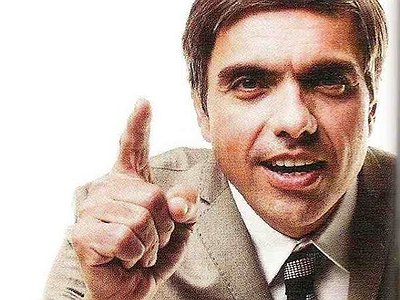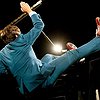Part 2
What, if anything, do you personally draw from the cosmos of electronic music and digital production tools that is inspiring for your daily practise? In how far do you see the potential for a mutual creative pollination between the two?
I have never used electronics extensively in my music, and never to help me compose. I could not work with something like Max MSP, it doesn’t interest me at all. For me the biggest fun in composing is inventing the music in my head, if I leave the process of composing to some module (even if this module follows my commands to the point) I take away the one thing that keeps me working! I think that our mind can create enough crazy stuff, I don’t need a computer for that. If I want crazy chord progressions, I simply write them, I don’t need a tool for that. And I don’t want to create chord progressions that are completely out of my control and have nothing to do with my tastes or dislikes, that just follow some algorithms. I want my music to to be me, in good and bad.
I know my way around editing programs, but digital pre-production has never been something that interests me. I know students who go to great pains to simulate their music before it is played live, but I like the mystique of the live performance so much that I don’t want to ruin it for me beforehand.
Lately I have increasingly incorporated electronic beats in my pieces (like in my recent “Leipzig Noir” piece), but then I have collaborated with assistants to help me. But that could be something that I want to learn more in the future, working with electronics as an instrument.
I actually do like electronic instruments a lot – I have written a lot for instruments like Theremin and Electric Guitar for example.
How do you see the relationship between timbre and composition?
I usually like to shock people with my notion that sound is actually the most uninteresting aspect of music. Sound doesn’t interest me at all, it is a means, not an end. Composers constantly talk about sound, but writers don’t talk about fonts. For me fonts and sounds are the same, they are exterior, not interior. Writers don’t obsess over possible fonts, layout considerations and the printed book while writing, they mainly invent stories. Reading a book with a beautiful font and good production values is great, but it doesn’t make the book good if the writing is bad. In the end the book has to be about something, and the same can be said about music.
My ideal is music that can be played on a lousy mono record on the worst turntable imaginable on squeaky amps … and is still able to reach your heart. Imagine listening to Schubert’s C-Major quintet like this – it would still move you to tears. Of course it’s nice to hear that piece on great instruments and with great players and a perfect acoustic, but it’s like an extra bonus, not a necessity.
The 21st century is obsessed with sound, with “production” (especially in pop music) and also with timbre. Of course I would be a fool to not acknowledge the importance of timbre, of choosing the “right” sound for something, and I certainly do appreciate good orchestration and strive for it myself. But the biggest care has to be taken with what the music is actually about. And that often can transcend considerations of timbre.
I know composers who can ramble on about granular synthesis and spectral analysis but are not in the least able to write a convincing melody. Let’s talk about melody, the great undiscovered country of the 21st century. Show me a good melody and I show you a good composer. And I don’t mean conventional melodies at all – I mean melodic writing. Melody is like language, it communicates directly. It’s such a great tool, and practically no composer is using it anymore, especially not in pop music!
Time is a variable only seldom discussed within the context of contemporary composition. Can you tell me a bit about your perspective on time in relation to a composition and what role it plays in your work?
For me timing is more important than actual time – a boring shorter piece can of course still seem endless, while a longer exciting piece might pass you by like a breeze. I feel that each piece has its inherent “perfect” length, and one of the things I strive for in composition is to achieve this. A longer piece will have to start in a different way than a short piece for example.
To ensure that I always keep track of the pacing of a piece I always rigidly work in the same direction that the listener experiences – forward with the arrow of time, from the beginning to the end. I constantly reread what I have written so far to ensure that the composition goes where it needs to go, not necessarily where I’ve planned it to go. There are a lot of boring pieces with the most interesting concepts out there, but in the end somebody has to listen to it, has to experience it. And I don’t want that person to be bored.
What do improvisation and composition mean to you and what, to you, are their respective merits?
Composition for me is improvisation of the mind. My mind can improvise much quicker than my fingers, and I can select things that I like and that I dislike before I write them down. But improvisation is of course the source of all music, it is how music was created, when stone age men drilled random holes in a bone and made a flute out of it. They improvised, and that was a beautiful thing, because improvising also means discovering the unexpected. But the greatest danger of improvisation is of course redundancy – which anybody can confirm who has ever listened to long vain free jazz solos that just muck around endlessly. For me the responsibility as a composer is to remove redundancy, to bring things to a point. This is why I relatively rarely use improvised passages in my music – once I removed that redundancy through the process of composition I don’t need the improvisation anymore. But I improvise a lot while composing, both in my head and also at the piano.
Do you feel it important that an audience is able to deduct the processes and ideas behind a work purely on the basis of the music? If so, how do you make them transparent?
Great art is always mysterious, so to explain everything and to guide constantly is not always a good thing. I think we talk about a different thing here, and that is if the music is engaging or not. If the music is engaging I don’t have to understand everything, but I can be involved in its mysteries. The intricacies of a Bach fugue are not audible for the first time, even for professional listeners. But the polyphony that Bach creates exudes a confidence that everything is right, because there are rules, some open, some hidden. And sometimes these rules are also broken, and that is also a mystery. But a fugue uses certain principles to “explain itself”, there is a theme, and a counter-theme, and voice entrances that follow a certain order. Even a non-musician can understand these principles subconsciously. In New Music we can create similar things, and it is important that we lay out part of the rules we use in the open, simply to open a doorway to the deeper mysteries and magic tricks that I hope everybody of us uses. A glimpse is enough, never over-explain! That is true in film, literature and music.








